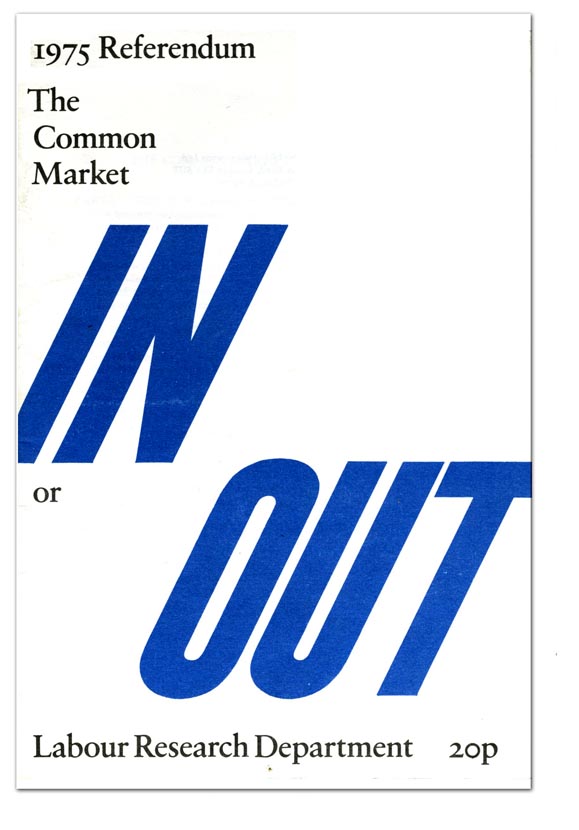08/05/2014
 At great expense, I recently obtained this historic copy of a pamphlet by the Labour Research Department, dated 15 March 1975. Reproduced below is the text from page 30, headed "The Alternative".
At great expense, I recently obtained this historic copy of a pamphlet by the Labour Research Department, dated 15 March 1975. Reproduced below is the text from page 30, headed "The Alternative".
What immediately strikes one is how little the arguments have changed in what passes for the mainstream, so much so that, with only a little tweaking, this could easily have passed muster as a finalist for the IEA "Brexit" prize.
On the other hand, if this represented the Labour Party view in its unadulterated form, one can quite easily see from the final paragraphs how simple Conservatives might have seen the EEC as a good idea. Anyhow, in this quiet corner if the blogosphere, things are at least changing. Enjoy this while you can:
Supporters of our staying in the Common Market say that if we leave we shall be on our own and out in the cold, deprived of the friends we need. The truth is exactly the opposite. Only by leaving can we recover the powers that are needed for entering into equal trading relations with all countries in the world.
Freed from the restraints of the Common External Tariff, the Common Commercial Policy and the Common Agricultural Policy we shall be able to re-establish our former trading links with low-cost food suppliers and to enter into new links whenever suitable.
We shall be able to resume our former relations with the countries that used to belong to the European Free Trade Area â Sweden, Norway, Portugal, Austria and Switzerland â by entering into an agreement for an industrial free trade area with them, as indeed the EEC has done.
We should also be able to enter into an agreement with the EEC for industrial free trade, for it will be in their interest as well as ours to retain their trading links with us. We shall not be out in the cold at all; but we shall abandon our membership of a regional trading bloc and the use of its bargaining power to support its multinational companies.
These measures will stop the diversion of our trade into the Common Market caused by our membership of it, and in addition we shall be free to take positive measures to increase our trade with developing countries and socialist countries and others who have a greater need for our manufactured goods than the EEC countries who make the same sorts of goods as we do.
We shall have the power to impose selective import controls which have now become a necessity in order to overcome our huge balance of payments deficit. We shall also be able to enter into long-term trading agreements for the purchase of food or commodities on favourable terms. In short, outside the Common Market we shall be able to plan our foreign trade instead of having to leave it in the hands of blind market forces.
Released from the burden of the CAP we shall be free to buy our food wherever it is cheapest including the EEC, and shall be able to restore the deficiency payments system which is best suited to the needs of our farmers.
Freed from the restraints of the Rome Treaty and its competition policy we shall be able to extend public ownership and advance towards socialism at a pace determined solely by the British people and their parliamentary democracy.
Our problems would never be overcome, of course, if we left the Common Market only to pursue the disastrous type of policy favoured by the Tory party in the years 1970-74, relying on competitive market forces combined with state support for the multinationals. Our withdrawal from the Common Market only makes sense if we use the opportunity it will give to make fundamental economic and social changes.
FORUM THREAD
 At great expense, I recently obtained this historic copy of a pamphlet by the Labour Research Department, dated 15 March 1975. Reproduced below is the text from page 30, headed "The Alternative".
At great expense, I recently obtained this historic copy of a pamphlet by the Labour Research Department, dated 15 March 1975. Reproduced below is the text from page 30, headed "The Alternative".